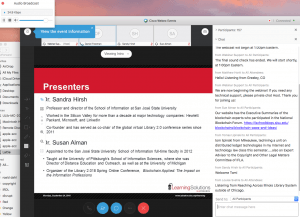Sep
2018
blockchain and information professions
Blockchain: Recommendations for the Information Profession
Monday, September 24, 2018 12:00 pm
Central Daylight Time (Chicago, GMT-05:00)
Blockchain technology is being discussed widely, but without clear directions for library applications. The Blockchain National Forum, funded by IMLS and held at San Jose State University’s iSchool in Summer 2018, brought together notable experts in the information professions, business, government, and urban planning to discuss the issues and develop recommendations on the future uses of blockchain technology within the information professions. In this free webinar, Drs. Sandy Hirsh and Sue Alman, co-PIs of the project, will present the recommendations made throughout the year in the Blockchain blog, Library 2.0 Conference, Blockchain Applied: Impact on the Information Profession, and the National Forum.
157 – 200 participants in the workshop
IMLS funded project goal
San Jose State U School of Information awarded this grant: https://ischoolblogs.sjsu.edu/blockchains
http://www.youtube.com/c/Library20
now what is blockchain, and not how to implement, but only certain issues will be discussed.
Issues: legal, security and standards and Applications: academic, public and archives
BLockchain and the Law bt Primavera De Felippi and Aaron Wright : http://www.hup.harvard.edu/catalog.php?isbn=9780674976429
Privacy: https://www.investopedia.com/terms/g/general-data-protection-regulation-gdpr.asp
Is Blockchain (BC) content or provider?
Q/S TO ASK: WHAT KINDS OF DATA AND RECORDS MUST BE STORED AND PRESERVES exactly the way they were created (provenance records, transcripts). what kinds of info are at risk to be altered and compromised by changing circumstances (personally identifiable data)
Security issues: https://www.technologyreview.com/magazine/2018/05/
515 rule: BC can be hacked if attacked by a group of miners controlling more than 50% of the network
Standards Issues: BC systems- open ledger technology for managing metadata. baseline standards will impact future options. can BC make management of metadata worth. Is it worth, or more cautious.
Potential Use cases: archives and special collections where provenance and authenticity are essential for authoritative tracking. digital preservation to track distributed digital assets. BC-based currencies for international financial transactions (to avoid exchange rates ILL and publishing) . potential to improve ownership and first sale record management. credentialing: personal & academic documents (MIT already has transcripts and diplomas of students in BC – personal data management and credentialing electronically).
public libraries: house docs of temporarily displaced or immigrants. but power usage and storage usage became problems.
a city south of Denver CO is build right now, and will be build on these principles.
benefits for recordkeeping: LOCKSS (lot of copies keeps stuff safe) – Stanford U; chain of custody (SAA Glossary); Trust and Immutability (BC) vs confidentiality and performance (dbase)
Libarians role: need to understand BC (how does it work and what can it do for us; provide BC education for users; use BC in various applications
recommendations from National Forum:
ASIS&T presentation in Vancouver, Nov. 2018; MOOC on BLockchain Basics; Libary Futures Series, BOok3 Alman & Hirsh
from Miriam Childs to All Participants:
Blockchain is suing Blockchain: https://nulltx.com/blockchain-is-suing-blockchain-things-are-getting-messy-in-crypto-world/
from Lilia Samusenko to All Participants:
Sounds like blockchain also can support the Library-Of-Things initiatives. What do you think?
+++++++++
more on blockchain in this IMS blog
https://blog.stcloudstate.edu/ims?s=blockchain
